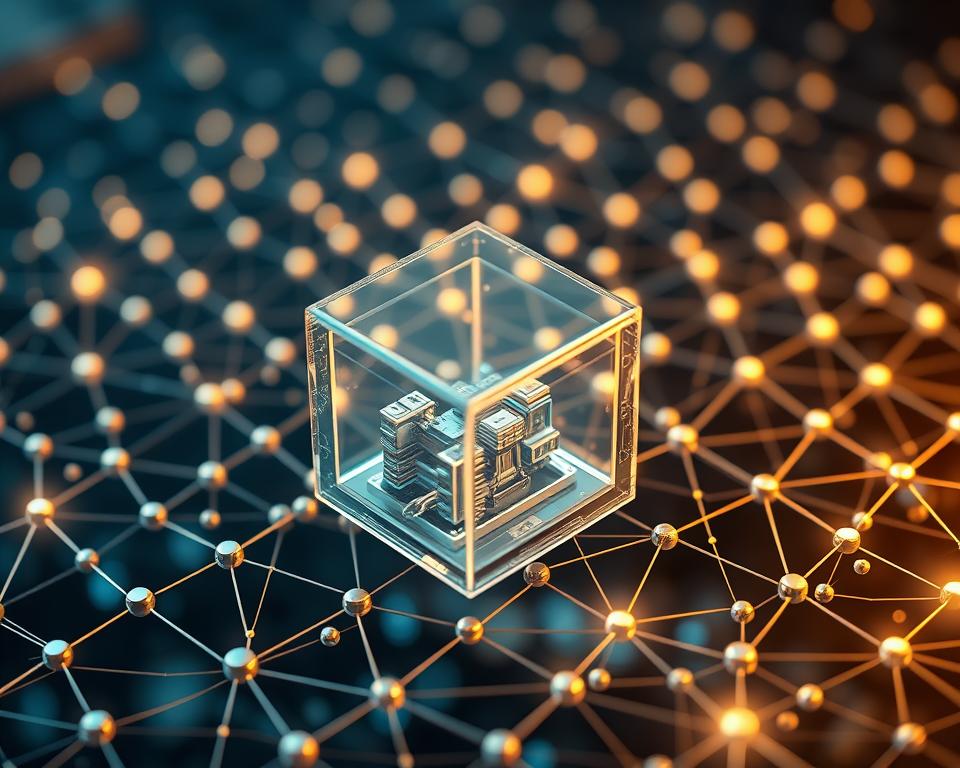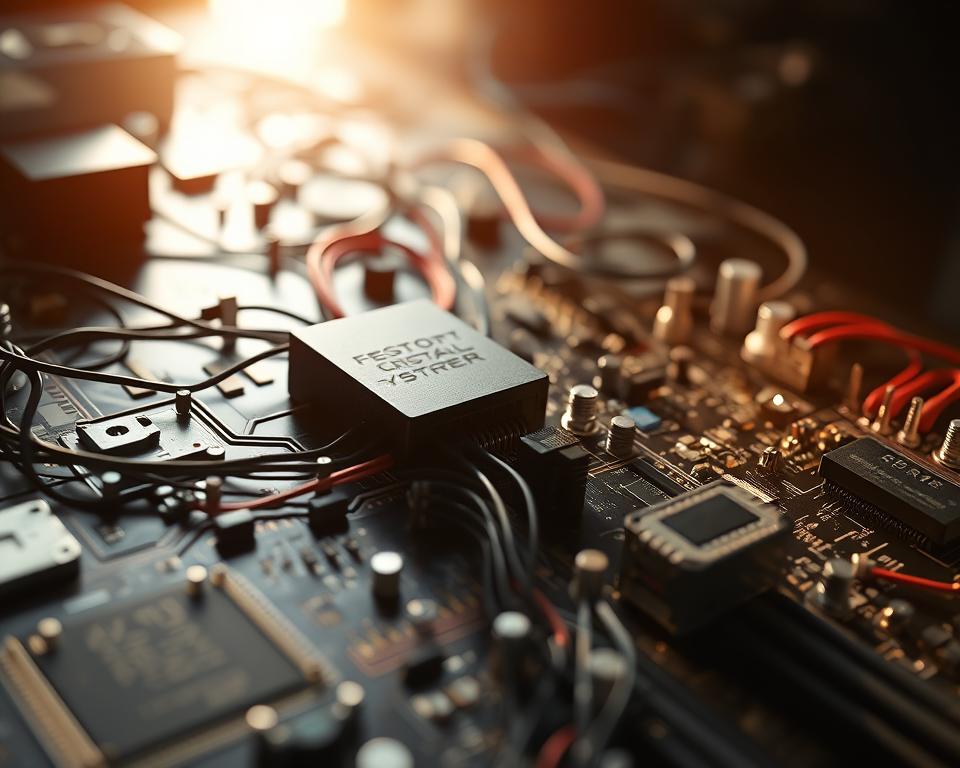Blockchain technology is changing the game for artificial intelligence. It makes AI models more transparent. This is key because AI’s decision-making processes are often unclear.
Blockchain uses decentralized data storage. This means data is safe and easy to track. It’s crucial for training AI models.
By combining blockchain and AI, we get more transparent models. These models have a clear record of all their actions. This builds trust and ensures fairness.
Blockchain also protects user data. It keeps it safe from misuse. This is important for keeping AI systems honest.
Blockchain makes AI models more transparent. It lets us track and verify the data used to train them. This ensures the models are fair and unbiased.
Table of Contents
Key Takeaways
- Blockchain technology can help create more transparent AI models
- Decentralized data storage can provide a secure and transparent way to store and manage data
- Blockchain technology can help build trust in AI systems
- The integration of blockchain technology and AI can help protect user data
- Blockchain technology can help improve the transparency of AI models
- Blockchain technology can help ensure that AI models are fair and unbiased
Understanding the Current Challenges in AI Transparency
AI systems are now a big part of our lives, raising concerns about their openness and fairness. The black box problem in AI decision making is a major issue. It means we don’t fully understand how these systems make choices, even by those who create them.
This lack of clarity leads to trust issues with AI. People are unsure how their data is used or what biases might affect AI decisions. This makes them question the reliability of these systems.
Another big problem is data privacy concerns. AI systems need lots of personal data to work well. But, if this data isn’t kept safe, it can cause serious problems like identity theft. To solve these issues, we need AI models that are clear about their choices and protect user data well.
- Lack of explainability in AI decision making
- Insufficient transparency in data collection and usage
- Inadequate security measures to protect user data
By facing and solving these problems, we can build more open and reliable AI systems. These systems should focus on keeping user data safe and private.
The Fundamentals of Blockchain Technology
Blockchain technology is based on blockchain fundamentals. These basics help create decentralized networks. These networks are safe for storing and sharing data, thanks to cryptography.
The heart of blockchain is its ability to make a clear and unchangeable ledger. This ledger records and links all transactions together.
Some key features of blockchain technology include:
- Decentralized data storage
- Immutable record keeping
- Secure transactions through cryptography
Knowing blockchain fundamentals is key to using decentralized networks and cryptography in many areas. This includes AI and data storage. By using these technologies, we can make systems more secure, open, and efficient.
How Blockchain Can Create More Transparent AI Models: A Technical Overview
Blockchain technology is changing artificial intelligence. It offers a way to store and manage data that’s open and checkable. With decentralized data storage, AI models can learn from a huge amount of data. This makes them more accurate and reliable.
Blockchain also makes AI data safe and unchangeable. This is key for AI in healthcare or finance. It ensures AI decisions are clear and can’t be altered.
Smart contracts are another big part of blockchain in AI. They let AI systems work on their own, without needing people. This makes AI systems more efficient and able to grow.
Using blockchain in AI has many benefits. These include:
- More transparency and accountability
- Better data security and integrity
- More trust and reliability
Blockchain helps AI developers make models that are open, safe, and dependable. These models can handle important decisions.
The Role of Distributed Ledger Technology in AI Development
Distributed ledger technology is changing AI development by making it more transparent and accountable. It helps create a secure, open record of AI’s decision-making. This makes AI systems more trustworthy and easier to understand. For example, AI development can use this tech to show clearly where data comes from and how it’s trained.
Using distributed ledger technology in AI development offers several benefits:
- Immutable record keeping
- Decentralized data storage
- Smart contract integration
These advantages help make AI systems more transparent and accountable. This makes them more reliable and trustworthy.
In summary, distributed ledger technology is a game-changer for AI development. It ensures AI’s decision-making processes are secure and open. As AI becomes more widespread, focusing on transparency and accountability is crucial. Distributed ledger technology is key to achieving this goal.
| Benefits | Description |
|---|---|
| Immutable record keeping | Ensures that records cannot be altered or deleted |
| Decentralized data storage | Allows for secure and distributed data storage |
| Smart contract integration | Enables the automation of contracts and agreements |
Blockchain-Based AI Model Training
Blockchain-based AI model training is a new way to make AI more open and reliable. It uses blockchain technology to train AI models. This method ensures AI models are built on transparent data sources, which is key for trust in AI.
Blockchain technology helps track and verify AI model training. This makes sure AI models are fair and dependable. Some benefits include:
- Immutable record-keeping
- Decentralized data storage
- Smart contract integration
Transparent Data Sources
Transparent data sources are vital in blockchain-based AI model training. They ensure AI models are trained on accurate, unbiased data. This is crucial for trust in AI decisions.
Verifiable Training Processes
Verifiable training processes are a big plus of blockchain-based AI model training. Blockchain technology allows developers to keep a record of AI model training. This lets them check and confirm the accuracy of their AI models.
Enhancing AI Decision Traceability Through Blockchain
Blockchain technology can greatly improve AI decision traceability. It offers a clear and verifiable record of AI’s decision-making. This makes AI’s processes more transparent and accountable.
Using blockchain for AI decision traceability has many benefits. It creates an immutable record of AI’s decisions. This ensures all choices can be tracked and verified. Blockchain helps in several ways:
- It provides a clear and verifiable record of AI’s decision-making.
- It creates an immutable record of all AI decisions.
- It increases transparency and accountability in AI’s choices.
Blockchain technology boosts trust in AI models. It ensures decisions are fair and transparent.
Blockchain could change how we track AI decisions. It brings a new level of transparency and accountability. As AI use grows, making decisions transparent is crucial. Blockchain is key to achieving this.
| Benefits of Blockchain in AI Decision Traceability | Description |
|---|---|
| Immutable Records | Blockchain provides an immutable record of all decisions made by an AI model, ensuring transparency and accountability. |
| Transparent Decision-Making | Blockchain enables the creation of transparent and auditable records of AI decision-making processes, allowing for greater trust in AI models. |
Data Privacy and Security Benefits
Blockchain technology in AI brings many benefits for data privacy and security. It helps people control their personal info better. For example, ensuring user privacy in mobile apps is key, and blockchain can help a lot.
Some main security perks of blockchain-based AI include:
- Immutable record-keeping, which means user data can’t be changed or deleted
- Decentralized data storage, which lowers the chance of data breaches
- Access control frameworks, which let users decide who sees their data
Also, consent management systems can be set up. They make sure users know and agree to how their data is used. Smart contracts can make this process automatic, following users’ wishes.
In summary, blockchain in AI systems offers big wins for data privacy and security. It boosts user data protection and access control.
| Security Benefit | Description |
|---|---|
| Immutable Record-Keeping | Ensures that user data cannot be altered or deleted |
| Decentralized Data Storage | Reduces the risk of data breaches |
| Access Control Frameworks | Enables users to control who can access their data |
Real-World Applications and Use Cases
Blockchain technology is making AI more transparent and accountable in many areas. In healthcare, it securely stores patient data. This helps in sharing medical records, tracking prescriptions, and verifying clinical trials.
In finance, blockchain technology is creating secure AI trading platforms. These platforms use smart contracts to make trades automatically and securely. They also help prevent fraud like money laundering and identity theft.
Here are some examples of real-world applications of blockchain in AI:
- Supply chain management: It tracks and verifies goods’ origin, quality, and movement.
- Identity verification: It securely stores and manages identity documents like passports and driver’s licenses.
- Smart cities: It manages and optimizes urban infrastructure, like energy grids and transportation systems.
These examples show blockchain’s potential in making AI more transparent and accountable. They highlight the need for ongoing research and development.
As blockchain technology in AI grows, we’ll see more innovative uses. It will help create more secure and accountable AI models. These models will benefit society as a whole.
| Industry | Application | Benefits |
|---|---|---|
| Healthcare | Secure storage and management of patient data | Improved data security and privacy |
| Finance | Transparent and secure AI-powered trading platforms | Reduced risk of fraudulent activities |
| Supply Chain Management | Tracking and verification of goods | Improved supply chain efficiency and transparency |
Implementation Challenges and Solutions
Using blockchain in AI comes with technical barriers and scalability issues. These problems make it hard to use blockchain in AI. To solve these, picking the right tech stack is key, as explained in the article on how to choose the right tech for apps.
Some big implementation challenges include:
- Integrating blockchain with existing AI systems
- Ensuring the scalability of blockchain-based AI solutions
- Addressing technical barriers such as interoperability and compatibility issues
To beat these challenges, knowing both blockchain and AI well is vital. This way, developers can make blockchain-based AI that works well, is secure, and efficient. Also, using distributed ledger tech and cloud infrastructure helps with scalability issues.
In short, solving implementation challenges, technical barriers, and scalability issues is key for blockchain-based AI success. By tackling these, developers can make groundbreaking AI that uses blockchain’s power.
| Challenge | Solution |
|---|---|
| Technical Barriers | Interoperability and compatibility solutions |
| Scalability Issues | Distributed ledger technology and cloud-based infrastructure |
| Implementation Challenges | Choosing the right technology stack and designing scalable solutions |
The Impact on AI Governance and Compliance
Blockchain technology is changing how we manage AI. It makes sure AI systems follow rules by keeping track of their decisions. AI governance is key here, as it sets rules for AI to be fair and open.
Blockchain helps keep data safe and unchanged. This is crucial in fields like healthcare and finance.
Blockchain is used in AI governance in several ways:
- Transparent and auditable record-keeping
- Secure data storage and management
- Automated compliance monitoring
This technology builds trust in AI. As AI grows, so will the role of blockchain technology in making sure AI is used right.
Future of Blockchain-AI Integration
The future of blockchain-AI integration looks bright, with emerging technologies and potential breakthroughs ahead. As blockchain and AI grow together, we’ll see new uses of this tech. For instance, blockchain-based AI can make AI choices more open and fair. This is thanks to more transparent and accountable AI decision-making.
Some key areas for growth in blockchain-AI integration include:
- Improved data security and privacy
- Increased transparency and accountability in AI decision-making
- Enhanced efficiency and scalability of blockchain-based AI models
Emerging Technologies and Potential Breakthroughs
The future of blockchain-AI integration will be shaped by new technologies and breakthroughs. These will come from areas like decentralized data storage, immutable record-keeping, and smart contract integration. As these technologies grow, we’ll see more innovative uses of blockchain-AI. This will help drive growth and adoption in many industries.
| Technology | Potential Breakthroughs |
|---|---|
| Decentralized Data Storage | Improved data security and privacy |
| Immutable Record-Keeping | Increased transparency and accountability |
| Smart Contract Integration | Enhanced efficiency and scalability |
Best Practices for Implementation
Implementing blockchain technology in AI requires careful planning. Transparent and auditable records of AI decisions are key for trust and accountability. Blockchain offers a secure, decentralized way to manage these records.
Here are some important steps to consider:
- Choosing the right blockchain platform for your specific use case
- Ensuring data quality and accuracy
- Implementing robust security measures to protect against potential threats
By following these best practices, organizations can make AI more transparent and trustworthy. This can greatly improve AI development, making it more efficient and effective.
As blockchain technology in AI grows, staying updated is crucial. Keeping up with the latest best practices and trends helps organizations maximize their AI investments. This way, they can lead in this fast-changing field.
| Best Practice | Description |
| — | — |
| Data Quality | Ensuring data accuracy and quality |
| Security | Implementing robust security measures |
| Transparency | Providing transparent and auditable records |
Industry Standards and Regulations
Blockchain technology in AI follows many rules and standards. It’s key to make sure AI models follow these rules. Compliance requirements help avoid data breaches and keep things clear.
Rules like the General Data Protection Regulation (GDPR) stress the need for data safety and getting consent. Companies must use strong measures to follow these regulations. This includes encrypting data, controlling who can access it, and doing regular checks.
Some important compliance requirements for blockchain-based AI models are:
- Transparent data sources
- Verifiable training processes
- Auditable model updates
Following these industry standards and regulations helps companies build AI models safely and responsibly. This keeps trust and integrity in the field.
| Regulation | Description |
|---|---|
| GDPR | General Data Protection Regulation |
| CCPA | California Consumer Privacy Act |
Conclusion
As we wrap up our look at blockchain and AI, it’s clear this combo could change AI forever. Blockchain makes AI more open and honest, which is key for trust. This is a big deal for AI systems.
Blockchain keeps data safe and unchanged, helping AI be more clear. It’s used in many areas, like health and finance. Its use is growing fast.
As blockchain and AI work together, we’ll see big steps forward. Big names like Google and Microsoft are diving into blockchain AI. Researchers are also making big discoveries.
Blockchain will likely shape AI’s future. As it gets better, we’ll see more honest and reliable AI. This is a thrilling time for AI, with blockchain leading the way.
By using blockchain, we can make AI smarter and more trustworthy. This is an exciting era for AI. Blockchain is set to be a big part of its future.



















